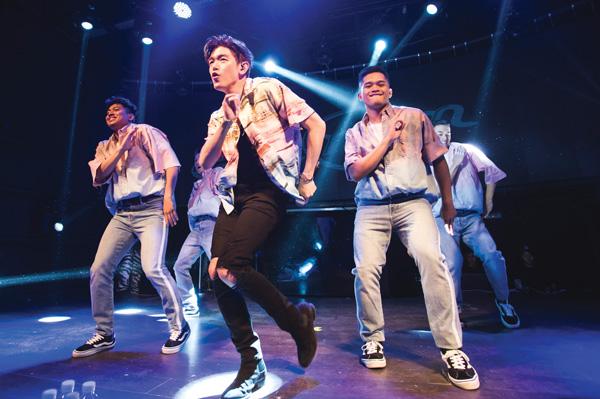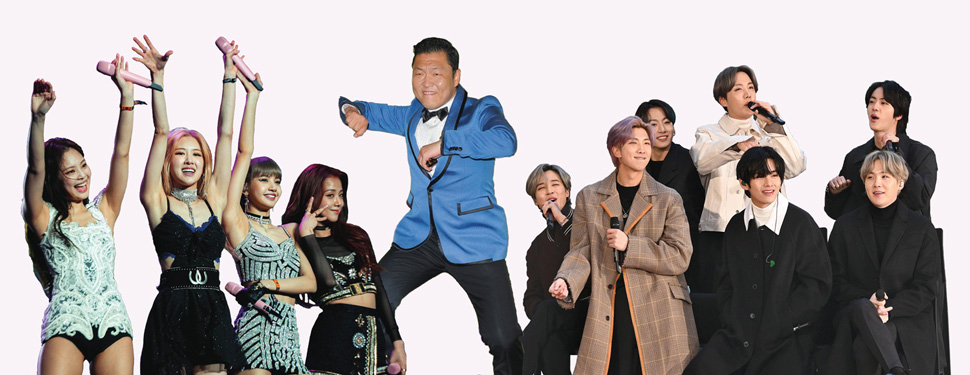Titciana Barros '11
The Roxbury Prep High School principal discusses how she sets her students up for long-term success.
Photo: CJ ENM
Teens and twentysomethings in Doc Martens and glittery eyeliner filled the Boston club Royale on a Friday night in February. They had come to see the Korean pop star Eric Nam '11, and several of them had stood outside the venue all day in the freezing cold to secure spots up front. Now, as they waited for Nam to take the stage for the sold-out show, they waved homemade signs ("Eric Phe-NAM-enol," "PROM WITH NAM?"), took countless selfies, and clutched dolls in his likeness.
Nam has a dedicated—and growing—fan base. Nam Nation, as his admirers are known, tends to skew young and female, and at the show they lined up at the merchandise table to buy hoodies and hats.
He is certainly a star on the rise, if not yet a household name. He was born in Atlanta to Korean immigrants, and has spent the past decade in South Korea, where he has climbed the music charts and become a famous TV host and celebrity interviewer. GQ Korea named him a 2016 “Man of the Year.” He landed on Forbes’ “30 Under 30” list in 2017 and oversees a social media juggernaut that includes almost three million Instagram followers, hyperactive Twitter and YouTube accounts, and two popular podcasts. “Me going to Korea and being a singer there wasn’t so much a ‘I want to be a K-pop star’ thing,” Nam told me backstage before the concert. “I just needed to start where I am accepted, where I’m not different, where I’m afforded the opportunities I wouldn’t be afforded here in the States.”
Korean popular music—known as K-pop—is a blend of dance music, hip-hop, R&B, jazz, and rock that’s sung mostly in Korean, with a few choice English words in the catchy refrains. It’s also big business, a global, multibillion-dollar industry. Acts like BTS and Blackpink are flooding American airwaves and making the late-night talk show rounds.
Now Nam, with the release last fall of his first English-language EP, Before We Begin, and a sweeping tour of Canada and the US, is riding the wave, finally poised to make his mark stateside. Of course, that was the plan all along.
Growing up in Georgia, Nam played the cello and piano. He daydreamed about being a musician but the path wasn’t clear. “It was never a realistic opportunity,” he said. Instead, Nam majored in international studies and minored in Asian studies at Boston College and joined the school’s Undergraduate Government and the Shaw Leadership Program. Robert Capalbo, the program’s founder and faculty fellow, called Nam one of his “all-time favorite” students. “He’s a very bright person, very personable and compassionate,” said Capalbo, who is also the associate director of stewardship and donor relations at BC.
While Nam threw himself headlong into his studies at BC, he kept his musical aspirations alive by establishing the local branch of Kollaboration, a Los Angeles–based Asian American artist collective with chapters around the country. He also uploaded videos of himself singing covers to YouTube—his solo take on the K-pop girl group 2NE1’s “Lonely” went viral.
An internship at Deloitte led to a consulting job there after graduation, but Nam deferred his start date to pursue microfinance initiatives in India. That’s where he was when he got the message telling him some of the cover songs he’d posted online had caught the attention of a scout for the reality TV competition Star Audition: Birth of a Great Star 2 (South Korea’s answer to American Idol). Nam was offered a spot in the competition, which would mean delaying his entry into the business world once again. “Everyone was like, Look, companies like Deloitte are always going to be there. It would be a shame not to take that risk and not to take that leap when you’ve been dying for it,” Nam recalled. “It was a big decision and I’m glad I took it.”
He finished in the top five on Star Audition and spun his fifteen minutes into a flourishing career as a K-pop singer/songwriter (releasing three EPs) and television personality (interviewing celebrities from Robert Downey Jr. and Emma Stone to Jamie Foxx). Through it all, though, Nam was looking west.
It was the summer of 2018 when he embarked on his first North American concert tour, with shows in fourteen cities. His timing couldn’t have been better. K-pop swept the Asian market in the 2000s, but the genre’s first Western hit didn’t arrive until 2012 with the smash single “Gangnam Style” by Psy. K-pop reached an even wider audience in 2018, when EXO and CL performed during the closing ceremony of the PyeongChang Olympic Winter Games—and today, superstars like BTS and Blackpink are selling out concerts around the world. K-pop’s infiltration can sometimes feel like the Generation Z equivalent of the boomers’ British Invasion.
The rise of K-pop has created cultural shock waves in the country of its origin. “For many young Koreans, K-pop stars represent their ideal image of themselves; for Korean leaders, they symbolize the promising future of their country,” Susanna Lim, an associate professor of Korean and Russian studies at the University of Oregon, wrote in a 2018 Conversation article.
Add in the international success of Asian-created works such as the movies Crazy Rich Asians and the Best Picture–winning Parasite, and Nam believes the cultural climate is right for his music to thrive in the US. But even as he’s looking to capitalize on this moment, Nam understands that his association with K-Pop could prove limiting. “I feel there is a singular mindset, a stereotype or perspective that people have about K-pop: There’s going to be seven, eight, ten guys or girls on stage who are perfectly in sync, with purple hair, doing flashy dances—which is true to an extent,” he said. “I am K-pop, but I also want to be seen as just pop—just playing music.”
It was time for Nam to take the stage at Royale, and he emerged to the delight of Nam Nation dressed in an orange windbreaker, paint-splattered jeans, and black Converse All Stars. Enveloped in a fog machine–produced haze, the singer bounced, shimmied, and even sprayed the front row with water bottles. Nam was often joined by four backup dancers, and his every body roll sent rippling sighs through the room. He chatted up the crowd, telling stories about his stern Korean mom and winking for emphasis. At one point, he leapt into the audience, held aloft by his fans’ raised hands as he sang.

Eric Nam performed in Madrid, Spain, on June 5, 2019. Photo: Mariano Regidor/Redferns
I’d never heard Nam’s music prior to the concert, but I found myself bobbing my head, and soon I was singing along. The songs—the frenetic energy—were infectious.
“All that jumping up and down—it tired me out just watching him,” said Capalbo, Nam’s professor from a decade ago. He took in the concert from the balcony, then went backstage. Capalbo has followed his former student’s career for years, listening to his music and watching his performances on YouTube. “Right in front of my eyes was the transformation of a quiet, studious, humble young man into an international star,” Capalbo said. “Eric’s enjoying himself and is bemused on some level by his success, but he’s got it all in perspective. If his career ended tomorrow, he would continue to do very important things for our society.”
Indeed, Nam’s mission is serious: to help open the door for more Asians and Asian Americans in entertainment and media. (And he’s not shy about sharing his thoughts on the matter in earnest monologues during his shows.) He told me that the only people who looked like him on TV when he was a child were Jackie Chan and Lucy Liu. “It was very limiting in terms of what we can do,” he said. “I don’t know if I’ll be the one to break out and be the next Justin Bieber or Bruno Mars. But I think doing these shows and speaking with people is enough to inspire the thirteen-year-old kid in his basement watching music videos to say, I can try that. And that’s kind of the goal.” ◽

Blackpink, Psy, and BTS. Photos: Nat Lim/Getty Images; DPA/Alamy; Sipa USA/Alamy
Psy
# of members: 1
Thanks to an earwormy refrain and accompanying viral video, “Gangnam Style”—Psy’s 2012 hit about an upscale Seoul neighborhood—became a cultural touchstone and the biggest song to ever come out of Asia. The one-time Berklee College of Music student has released subsequent albums but has yet to strike gold again in the US.
BTS
# of members: 7
To get an idea of just how big BTS is, watch their 2018 appearance on The Tonight Show Starring Jimmy Fallon. You can barely hear the perfectly coiffed members introduce themselves over the screaming. With three rappers and four singers, the group has collaborated with American artists Sia and Halsey, and churns out chart-toppers like “Boy with Luv” and “Black Swan.”
Blackpink
# of members: 4
Dynamic and impeccably dressed, this female quartet debuted in 2016. Today, they play arenas and each of the bandmates—Jisoo, Jennie, Rosé, and Lisa—is working on a solo project. Don’t say we didn’t warn you: Blackpink’s bouncy “Ddu-Du-Ddu-Du” (a 2019 Teen Choice Award winner) will get stuck in your head for days.
EXO
# of members: 9
This Chinese-South Korean boy band releases music in several languages and burst onto the international stage with a sharply choreographed, fireworks-studded performance at the closing ceremonies of the 2018 Olympic Winter Games in PyeongChang (singer-songwriter and rapper Lee Chae-rin—stage name CL—also appeared).
Monsta X
# of members: 6
With rabid fans that call themselves Monbebes, a recent collaboration with the American super-producer Steve Aoki, and a performance on the MTV Unplugged at Home online series alongside Melissa Etheridge, Alessia Cara, and Shaggy, this slick sextet has come a long way from their beginnings on the Korean reality television competition No.Mercy.